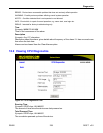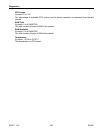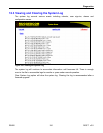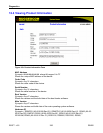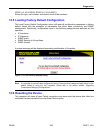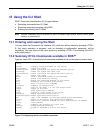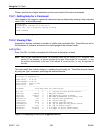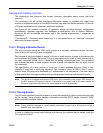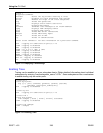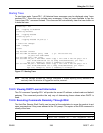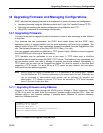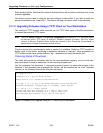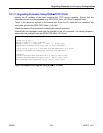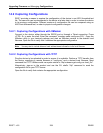
Using the CLI Shell
RS400 247 ROS™ v3.5
Viewing and Clearing Log Files
The crashlog.txt and syslog.txt files contain historical information about events that have
occurred.
The crashlog.txt file will contain debugging information related to problems that might have
resulted in unplanned restarts of the device or which may effect the device operation. A file size
of 0 bytes indicates that no untoward events have occurred.
The syslog.txt file contains a record of significant events including startups, configuration
modifications, firmware upgrades and database re-initializations due to feature additions.
Syslog.txt file will accumulate information until it fills, holding approximately 3 megabytes of
characters.
“Clearlogs<CR>” command resets these logs. It is recommended to run “clearlogs” command
after every firmware upgrade.
13.2.3 Pinging a Remote Device
The ping command sends an ICMP echo request to a remotely connected device. For each
reply received the round trip time is displayed.
The command “ping ip-address of device” will send a small number of pings to the device with
this ip-address and display the results. The ping command can be used to verify connectivity to
the next connected device. It’s is a useful tool for testing commissioned links. This command
also includes the ability to send a specific number of pings with specified time for which to wait
for a response.
The specification of a large number of pings and a short response time can “flood” a link,
stressing it more than a usual ping sequence. The command “ping 192.168.0.1 500 2” can be
used to issue 500 pings each separated by 2 milliseconds to the next device. If the link used is
of high quality then no pings should be lost and the average round trip time should be small.
Note: The device to be pinged must support ICMP echo. Upon commencing the ping an ARP request for
the MAC address of the device is issued. If the device to be pinged is not on the same network as
the device pinging the other device the default gateway must be programmed.
13.2.4 Tracing Events
The CLI trace command provides a means to trace the operation of various protocols supported
by the device. Trace provides detailed information including RSTP packet decodes, IGMP
activity and MAC address displays.
Notes: Tracing has been designed to provide detailed information to expert users. Note that all tracing is
disabled upon device startup.
In order to display the current trace settings and discover the systems that be traced, enter the
CLI command “trace ?”.



